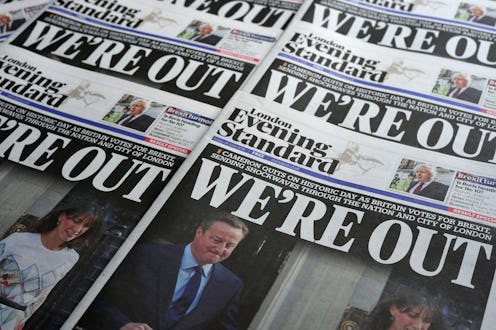News
The 7 Best Brexit Op-Eds
The United Kingdom, and Europe, and the entire world, are still absorbing the shock of last night’s Brexit vote, in which the U.K. voted to leave the European Union. Many observers are of the mind that, broadly speaking, the Brexit will have a negative impact on the world economy, but beyond that, it’s a huge question mark. In the meantime, these incisive op-eds about the Brexit may shed some light on the enormity of the issue — and the countless angles from which it can be analyzed.
The full impact of the Brexit is simply unknowable at this stage. Never before has a member nation left the EU, so these are truly uncharted waters. What’s more, the Brexit touches on a host of disparate political issues: Immigration policy, currency rates, unemployment, terrorism, domestic economic policy, national sovereignty, regulatory enforcement, and many more.
The Brexit connects all of those things, but we won’t know exactly how until at least two years from now, when the Brexit is actually implemented. The U.K. has created massive worldwide uncertainty by voting to withdraw from the EU, and things will remain uncertain for a while, there have been no shortage of hot takes on the Brexit, what it means and how the world ought to react. Here are some of the better ones:
The United Kingdom Should Strike A Deal
The Economist thinks the Brexit will be bad for the U.K. economy, and advises leaders to reach an agreement with the EU to continue some form of economic integration.
It would be bad for everyone if Great Britain shrivelled into Little England and be worse still if this led to Little Europe. The leaders of Leave counter with the promise to unleash a vibrant, outward-looking 21st-century economy. We doubt that Brexit will achieve this, but nothing would make us happier than to be proved wrong.
The EU Dug Its Own Grave
Slate’s Joshua Keating points out that, while the EU’s primary goal of preventing war was a success, it was poorly implemented in other ways and offered few visible upsides to many Europeans.
If the EU project has a future, its leaders and supporters need to find a way to make an affirmative case for it, not just warn voters of how expensive it would be to abandon it.
The Link Between The Brexit And Racism
Over at Medium, Chris Amade argues that racism fueled the Brexit vote — but economic inequality, along with the erosion of traditional social groups, fueled the racism.
The language we use to talk about those who have been left behind is rife with nasty attempts to turn them into lesser humans. We use the tactics of racist, and apply it to economic losers. And often they respond by joining racist groups. Or latching onto racist policies and agendas.... If you hate racism, then you really really really should hate any economic and social system that creates and rewards massive inequality. Because when you get that. You get racism.
The Brexit Has Nothing To Do With Trump
Some observers, such as Joseph Schatz, believe the Brexit vote was a localized phenomenon stemming from concerns specific to Europe. Therefore, it can’t be extrapolated to the American election.
It’s worth remembering that the British debate over the United Kingdom’s proper relationship with the EU is not new—certainly not as new as the broad-based backlash to free trade that’s helping to drive the 2016 American election...In fact, the United Kingdom has been fighting this raucous, existential battle for more than forty years now.
The Brexit Has Everything To Do With Trump
On the other hand, Richard Wolffe argues that the Brexit should serve as a warning to Americans, as it demonstrates the ease with which fringe demagoguery can infect major political parties.
[T]he rise of charismatic, far-right leaders can only happen when the weak leaders of the center-right surrender to them. This is what happened to the British Tories as they struggled through two decades of a rising and rebellious anti-European faction. We’ve been watching the Republican party do the same with the emerging Tea Partiers and Trumpers over the same period.
Will Brexit Affect The U.S. Election? It’s Too Soon To Say
Daniel Drezner argues that the Brexit will have an unpredictable and seemingly-contradictory effect on the US presidential race.
On the one hand, worsening U.S. economic prospects will benefit Trump. On the other hand, those same bad outcomes can help Clinton point out the policy disaster that a Trump administration would create. Either way, it puts U.S. politicians in the very odd and uncomfortable position of rooting against Britain’s near-term economic prospects.
The Polls Weren’t Wrong
Lastly, at the New York Times’ Upshot blog, Nate Cohn dispels of this fiction that the polls were wrong about the Brexit. Instead, he argues, it was the investors and bettors who miscalled the vote.
The polls consistently indicated that there was a very real chance that Britain would vote to leave. Polling averages even showed 'Leave' with a lead for most of the last month; over all, 17 of the 35 surveys conducted in June showed the Leave side with the edge, while just 15 showed Remain ahead.
The Brexit will almost certainly bring about massive economic, political and social change. Only time will tell exactly what form those changes take.
